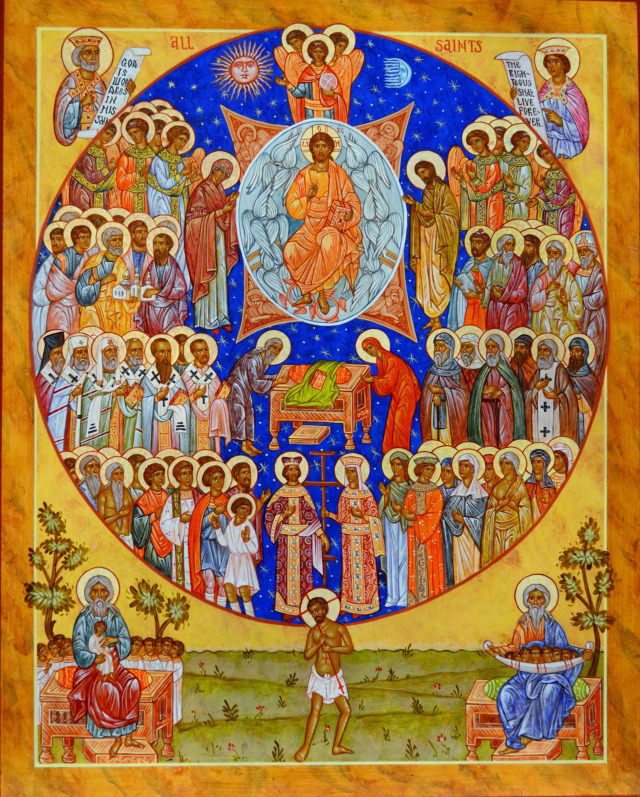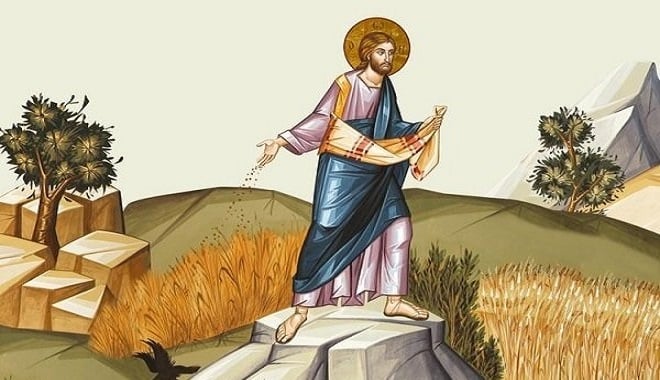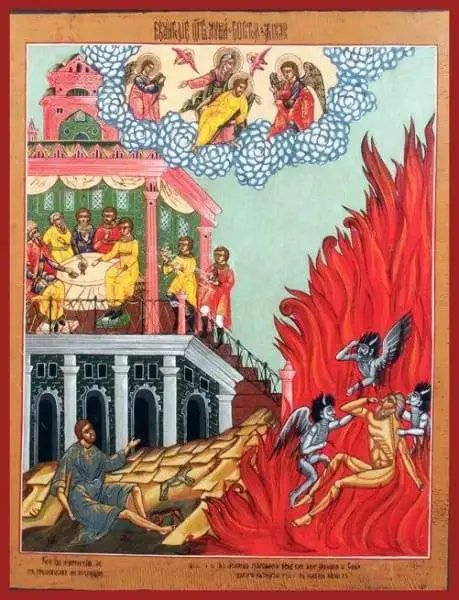
In the name of the ✠ Father, and of the ✠ Son, and of the ✠ Holy Spirit. Amen.
Dear Friends in Christ,
Today we celebrate the Feast of All Saints, when heaven opens before us like a vast garden where every flower has bloomed differently, yet all share the same light. The Church today does not merely remember the dead. She discovers the living. She does not catalogue heroes from a distant age. She recognises family.
Most remarkable about this feast is not its grandeur but its intimacy. We are not celebrating strangers who achieved impossible things. We are celebrating people who learned to love well. Mothers who prayed through sleepless nights. Merchants who refused to cheat their customers. Bishops who died defending their flocks. Desert fathers who battled their demons in silence. What unites them is not perfection but persistence, not sinlessness but surrender.
The Feast of All Saints whispers a dangerous secret: that the extraordinary lies hidden within the ordinary, waiting to be awakened by grace.
There was a woman in Wollongong who worked the night shift cleaning hospitals. Every morning, on her way home, she would stop at St Nektarios Church to light a candle and pray for her co-workers by name. She knew who was struggling with divorce, who had sick children, who drank too much, who felt forgotten.
She was not educated. She stumbled over the words in the prayer book. Her fingers were rough from work. But something in her presence made others feel seen. When someone missed work, she would visit. When families faced hardship, food would appear on their doorstep. No one questioned where it came from.
After she died, her fellow workers discovered she had been giving away most of her wages for years. Her own flat was nearly empty, but her heart had been full. At her funeral, the church overflowed. People spoke not of her achievements but of her attention. “She remembered my birthday when my own family forgot.” “She sat with me when Dad died.” “She never judged, only loved.”
The priest, looking out at faces he had never seen in church before, understood something profound. This woman had been preaching sermons every day of her life, not with words but with presence. She had been baptising people in kindness, absolving them through acceptance, offering them communion in the form of genuine care.
She had been a saint, and nobody had noticed until she was gone.
This is the mystery of holiness. It hides in plain sight. It wears work clothes and speaks with regional accents. It gets tired, makes mistakes, sometimes loses patience. But it keeps showing up. It keeps loving when love seems pointless. It keeps hoping when hope seems foolish. It keeps believing that every person matters to God.
St Gregory Nazianzen wrote that we are all called to become “gods by grace.” Not gods in the sense of power or privilege, but gods in the sense of love without limits, mercy without conditions, presence without pretence. The saints discovered this secret: that divinity is not something we achieve but something we receive, not something we earn but something we embody.
Look around this church today. Do you see saints? I do.
These are not perfect people. They are people being perfected by grace. They are people learning, slowly and sometimes painfully, to love as God loves.
In a culture obsessed with going viral, the saints chose to go deep. While we scroll through endless feeds of strangers’ highlight reels, they cultivated real relationships with real people in real places. While we chase validation from people who do not know our names, they sought transformation from the God who knows our hearts.
The saints understood something we are forgetting: that significance is not about being seen by millions but about seeing the one person in front of you. That influence is not about how many people follow you online but about how faithfully you follow Christ offline. That legacy is not about trending hashtags but about transformed hearts.
When I watch young people today desperately performing their lives for social media approval, my heart breaks for them. They are looking for what the saints found, but in all the wrong places. They want to matter. They want to belong. They want their lives to count for something. The saints tell them: you already matter to God. You already belong to his family. Your life already counts because you are loved.
And yet the saints were not escapists. They did not retreat from the world’s pain but entered it more deeply. St Basil built hospitals when governments ignored the sick. St John Chrysostom preached against inequality when the rich preferred comfortable sermons. St Mary of Egypt faced her brokenness in the desert and found wholeness. They transformed their times by refusing to accept them as permanent.
Today, when we feel overwhelmed by climate change, economic injustice, political division, and social media toxicity, the saints do not offer us easy escape routes. They offer us examples of engagement. They show us that holiness is not purity from the world’s problems but participation in God’s solutions. When everything feels broken, they remind us that God specialises in resurrection.
The feast reminds us that the Church is not just the institution we see on earth. It is the communion of all who have been united to Christ across time and space. When our local parish seems small or struggling, when church attendance dwindles, when faith feels isolated in an increasingly secular world, we need to remember that we are not alone. We worship surrounded by a great cloud of witnesses. The martyrs who died for the faith, the confessors who suffered for truth, the holy mothers and fathers who shaped our tradition all these join their voices to ours each time we sing the Divine Liturgy.
This is not mere sentiment. It is theological reality. As St Maximus the Confessor taught, in the Eucharist, heaven and earth are united. The saints are not absent from our worship. They are more present than we often realise. Their prayers support ours. Their example encourages ours. Their love enfolds ours.
And yet this feast also challenges our understanding of what it means to be remembered. In our digital age, when every moment is photographed and every thought is posted, when people fear being forgotten more than being wrong, the saints offer a different perspective. Many of them deliberately sought anonymity. They understood that true significance comes not from being remembered by history but from being known by God.
The unnamed saints we celebrate today the mothers who sacrificed everything for their children, the teachers who inspired generations of students, the workers who served with integrity, the neighbours who showed kindness without recognition all these remind us that holiness often wears the clothes of the ordinary. It is found not in the spotlight but in the shadows, not in the headlines but in the hidden acts of love that no camera captures.
This feast also speaks to our contemporary struggles with mental health, addiction, and despair. The saints were not immune to these battles. St Moses the Black was a former thief and murderer who found redemption in monasticism. St Augustine struggled with lust and pride before his conversion. St Silouan the Athonite wrestled with depression and spiritual darkness. They show us that sanctity is not about never falling but about always rising, not about perfection but about perseverance.
When young people tell us they feel worthless, when adults struggle with addiction, when families are torn apart by mental illness, the saints offer not easy answers but faithful companionship. They remind us that God’s love is not earned by goodness but received by grace, not achieved by effort but accepted by faith.
The angels and saints in our icons gaze not at us but beyond us, towards the divine light that transforms all things. They teach us where to look when life becomes overwhelming. Not inward to our failures, not backward to our regrets, not sideways to our comparisons with others, but upward to the source of all hope and healing.
In a world increasingly divided by nationalism, racism, and religious extremism, the feast of All Saints presents us with a different vision of human community. In heaven, there are saints from every nation, tribe, and tongue. There are rich and poor, educated and simple, young and old, all united not by earthly categories but by divine love. The kingdom of God is not homogeneous but harmonious, not uniform but unified.
So let us not think of the saints as distant heroes whose example makes us feel inadequate. Let us see them as older brothers and sisters who have walked the path we are walking, who have faced the struggles we are facing, who have found the hope we are seeking. They are not perfect people who never doubted but faithful people who kept believing despite their doubts.
The call to holiness is not a burden but a gift. It is the invitation to become who we were always meant to be. It is the promise that our lives, however ordinary they may seem, can become extraordinary through grace. It is the assurance that love is stronger than death, that goodness will ultimately triumph, that every act of kindness matters eternally.
Let us join our voices to theirs, our prayers to theirs, our hopes to theirs. Let us live not for earthly recognition but for heavenly reality. Let us love not for reward but for its own sake.
The saints have shown us the way. The path is open. The destination is certain.
To Him who makes all things holy and calls us all to be saints be glory and honour, now and forever and unto the ages of ages. Amen. ✠
Copyright © 2025 The Rev. Adrian Augustus. The Russian Orthodox Church of the Archangel Michael, Blacktown, NSW


